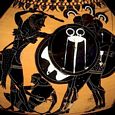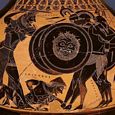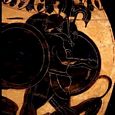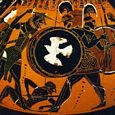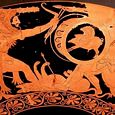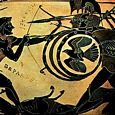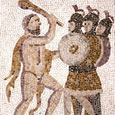GERYON
Greek Name
Γηρυων Γηρυονης
Transliteration
Gêryôn, Gêryonês
Latin Spelling
Geryon, Geryones
Translation
Earth-? (gê)
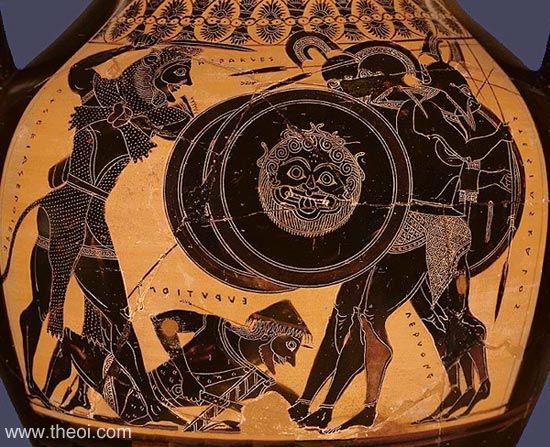
GERYON was a three-bodied, four-winged giant who lived on the island of Erytheia in the westernmost reach of the earth-encircling river Okeanos (Oceanus). He possessed a fabulous herd of cattle whose coats were stained red by the light of the sunset. Herakles was sent to fetch these as one of his twelve labours.
The hero reached the island by sailing across the Okeanos in a golden cup-boat borrowed from the sun-god Helios. There he encountered and slew the cattle-herder Eurytion, the two-headed guard dog Orthros (Orthus), and finally three-bodied Geryon himself. With this task complete the hero herded the cattle into his boat and led them back to the Greek Peloponnese.
Geryon may have originally been associated with the constellation Orion, his two-headed dog Orthos with the adjacent canines Canis Major and Minor, and his cattle with Taurus the bull. His father's name Khrysaor ("Golden Sword") was an appellation of the constellation Orion and most of Herakles other labours are connected with star groups.
The meaning of his name is unclear. It may be connected with the ancient Greek word gê (earth) or gêryô (singing).
FAMILY OF GERYON
PARENTS
[1.1] KHRYSAOR & KALLIRHOE (Hesiod Theogony 287,
Stesichorus Geryoneis Frag, Apollodorus 2.106, Hyginus Pref)
[1.2] KHRYSAOR (Ibycus Frag 282A, Diodorus Siculus
4.17.1)
OFFSPRING
[1.1] ERYTHEIA (Pausanias 10.17.5)
ENCYCLOPEDIA
GE′RYON or GERY′ONES (Gêruonês), a son of Chrysaor and Calirrhoë, a fabulous king of Hesperia, who is described as a being with three heads, and possessing magnificent oxen in the island of Erytheia. He acts a prominent part in the stories of Heracles. (Apollod. ii. 5. § 10.) The oxen of Geryones in Erytheia. The fetching of these oxen was a subject which was capable of great poetical embellishments, owing to the distant regions into which it carried the hero. The adventure is mentioned by Hesiod, but it is further developed in the later writers, and more especially by the Roman poets, who took a more direct interest in it, as it led the hero to the western parts of the world. The story runs as follows:-- Geryones, the monster with three bodies, lived in the fabulous island of Erytheia (the reddish), so called because it lay under the rays of the setting sun in the west. It was originally conceived to be situated off the coast of Epeirus, but afterwards it was identified either with Gades or the Balearian islands, and was at all times believed to be in the distant west. Geryones kept a herd of red oxen, which fed together with those of Hades, and were guarded by the giant Eurytion and the two-headed dog Orthrus. Heracles was commanded by Eurystheus to fetch those oxen of Geryones. He traversed Europe, and, having passed through the countries of several savage nations, he at length arrived in Libya. Diodorus makes Heracles collect a large fleet in Crete, to sail against Chrysaor, the wealthy king of Iberia, and his three sons. On his way he is further said to have killed Antaeus and Busiris, and to have founded Hecatompolis. On the frontiers of Libya and Europe he erected two pillars (Calpe and Abyla) on the two sides of the straits of Gibraltar, which were hence called the pillars of Heracles. As on his journey Heracles was annoyed by the heat of the sun, he shot at Helios, who so much admired his boldness, that he presented him with a golden cup or boat, in which he sailed across the ocean to Erytheia. He there slew Eurytion, his dog, and Geryones, and sailed with his booty to Tartessus, where he returned the golden cup (boat) to Helios.
Source: Dictionary of Greek and Roman Biography and Mythology.
CLASSICAL LITERATURE QUOTES
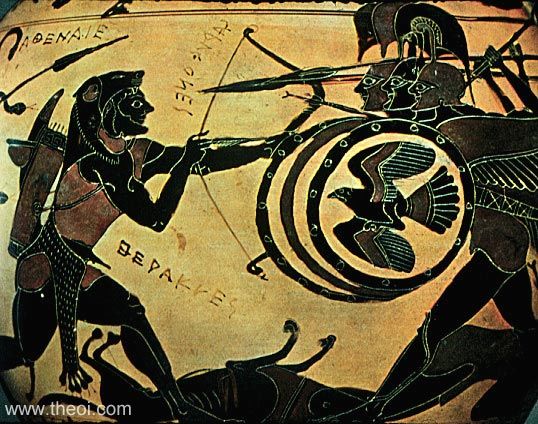
Hesiod, Theogony 979 ff. (trans. Evelyn-White) (Greek epic C8th or C7th B.C.)
:
"Kallirhoe (Callirhoe), daughter of Okeanos (Oceanus) lying in the embraces of powerful-minded Khrysaor
(Chrysaor) through Aphrodite the golden bore him a son, most powerful of all men mortal, Geryones, whom Herakles
in his great strength killed over his dragfoot cattle in water-washed Erytheia [the Sunset Isle]."
Hesiod, Theogony 287 ff. :
"Khrysaor (Chrysaor), married to Kallirhoe (Callirhoe), daughter of glorious Okeanos (Oceanus), was father
to the triple-headed Geryon, but Geryon was killed by the great strength of Herakles at sea-circled Erytheis
(Erythea) beside his own shambling cattle on that day when Herakles drove those broad-faced cattle toward holy
Tiryns, when he crossed the stream of Okeanos and had killed Orthos and the oxherd Eurytion out in the gloomy
meadow beyond fabulous Okeanos."
Eumelus of Corinth or Arctinus of Miletus, Titanomachia Fragment 7 (from Athenaeus
11. 470B) (trans. Evelyn-White) (Greek epic C8th B.C.) :
"Theolytos (Theolytus) says that he [Herakles] sailed across the sea in a cauldron [i.e. across Okeanos
(Oceanus) to reach Geryon in Erytheia]; but the first to give this story is the author of the
Titanomakhia."
Stesichorus, Geryoneis Fragment S7 (from Strabo, Geography) (trans. Campbell, Vol.
Greek Lyric III) (Greek lyric C7th to C6th B.C.) :
"The ancient writers seem to call the Baetis [a river in southern Spain, now called Guadalquivir]
Tartessos, and Gadeira [i.e. Gades, now Cadiz] and the nearby island Erytheia. This, it is supposed, is why
Stesichorus sould say of Geryon's herdman [Eurytion] that he was born ‘almost opposite famous Erytheia . .
by the limitless silver-rooted [i.e. because silver was mined in the region] waters of the river Tartessos in
the hollow of a rock.’"
Stesichorus, Geryoneis Frag S10 (from Papyri)
:
"[Menoites (Menoetes) urges Geryon to think of his parents :] ‘Your mother Kallirhoe (Callirhoe) and
Khrysaor (Chrysaor), dear to Ares.’"
Stesichorus, Geryoneis Fragment S11 (from Papyri) :
"[Geryon addresses Menoites :] Answering him the mighty son of immortal Khrysaor (Chrysaor) and Kallirhoe
(Callirhoe) said, ‘Do not with talk of chilling death try to frighten my manly heart, nor (beg me) . .
((lacuna)) for if I am by birth immortal and ageless, so that I shall share in life on Olympos, then it is
better (to endure) the reproaches . . ((lacuna)) and . . ((lacuna)) to watch my cattle being driven off far from
my stalls; but if, my friend, I must indeed reach hateful old age and spend mu life amoing short-lived mortals
far from the blessed gods, then it is much nobler for me to suffer what is fates than to avoid death and shower
disgrace on my dear children and all my race hereafter--I am Khrysaor's son. May this not be the wish of the
blessed gods . . ((lacuna)) concerning my cattle." [N.B. This text is from a fragmentary scrap of papyrus.]
Stesichorus, Geryoneis Fragment S12 (from Papyri) :
"And seeing him [Herakles] coming she [Kallirhoe (Callirhoe)] addressed him [her son Geryon] :
‘Strength wins victory . . ((lacuna)) hateful . . ((lacuna)) white . . ((lacuna)) Obey me, my
child.’"
Stesichorus, Geryoneis Fragment S13 (from Papyri) :
"[Kallirhoe (Callirhoe) addresses her son Geryon :] ‘I, unhappy woman, miserable in the child I bore,
miserable in my sufferings; but I beseech you, Geryon, if ever I offered you my breast . . ((lacuna)) at your
dear (mother's side,) gladdened . . ((lacuna)) by (your feasting).’ (With these words she opened) her
fragrant robe."
Stesichorus, Geryoneis Fragment S14 (from Papyri) :
"(For no-one) remained by the side of Zeus, king of all [in the assembly of the gods]; then grey-eyed
Athene spoke eloquently to her stout-hearted uncle, driver of horses [Poseidon]: ‘Come now, remember the
promise you gave and (do not wish to save) Geryon from death.’"
Stesichorus, Geryoneis Fragment S15 (from Papyri) :
"In his mind he distinguished [Herakles who was deliberating on whether to kill Geryon by stealth or in an
open fight,] . . ((lacuna)); it seemed to him to be much better . . ((lacuna)) to fight by stealth . .
((lacuna)) against the mighty man; . . ((lacuna)) (crouching) on one side he devised for him . . bitter
destruction; and he [Geryon] kept his shield in front of (his chest, but the other struck his brow with a
stone); and from his head (immediately with a great clatter) fell the helmet with its horse-hair plume; (and it
remained there) on the ground . . ((lacuna))
[Herakles arrow] (Bringing) the end that is hateful (death), having (doom) on its head, befouled with blood and
with . . ((lacuna)) gall, the anguish of the dapple-necked Hydra, destroyer of men [i.e. Herakles used an arrow
poisoned with the Hydra's venom]; and in silence he thrust it cunningly into his brow, and it cut through the
flesh and bones by divine dispensation; and the arrow held straight on the crown of his head, and it stained
with gushing blood his breatplate and gory limgs; and Geryon drooped his neck to one side, like a poppy which
spoiling its tender beauty suddenly sheds its petals."
Stesichorus, Geryoneis Fragment S17 (from Athenaeus, Deipnosophistae) :
"Stesikhoros says that Helios (the Sun) sailed across Okeanos (Oceanus) in a cup and that Herakles also
crosssed over in it when travelling to get Geryon's cattle."
Stesichorus, Geryoneis Fragment S86 (from Scholiast on Apollonius Rhodius)
:
"Stesikhoros in his Geryoneis calls an island in the Atlantic sea Sarpedonian."
Stesichorus, Geryoneis Fragment S87 (from Scholiast on Hesiod's Theogony)
:
"Geryon is son of Kallirrhoe (Callirhoe), daughter of Okeanos (Oceanus), and Khrysaor (Chrysaor).
Stesikhoros says he has six hands and six feet and is winged."
Ibycus, Fragment 282A (trans. Campbell, Vol. Greek Lyric III) (Greek lyric C6th B.C.)
:
"[Herakles] killed Geryones, son of Khrysaor (Chrysaor)."
Pindar, Fragment 169 (trans. Sandys) (Greek lyric C5th B.C.) :
"The labours of Herakles; for he drave to the Kyklopian (Cyclopian) portals of Eurystheus the kine of
Geryon, which he had won neither by prayer nor by price."
Aeschylus, Agamemnon 869 ff (trans. Weir Smyth) (Greek tragedy C5th B.C.)
:
"Or if he had died as often as reports claimed, then truly he might have had three bodies, a second Geryon,
and have boasted of having taken on him a triple cloak of earth, one death for each different shape."
Aeschylus, Fragment 37 Heracleidae (from Scholiast on
Aristeides) :
"Starting thence, when that he [Herakles] had crossed Okeanos (Oceanus) in a golden bowl
[belonging to the sun-god Helios], he drave the straight-horned kine from the uttermost parts of the earth, slew
the evil herdsmen [Eurytion] and their triple-bodied master [Geryon], who wielded three spears in his (right)
hands; in his left, extending three shields, and shaking his three crests, he advanced like unto Ares in his
might."
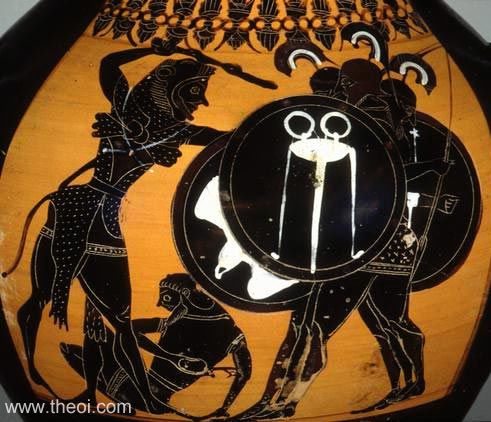
Plato, Gorgias 484b (trans. Lamb) (Greek philosopher C4th B.C.) :
"Pindar . . . in the ode says--‘Law the sovereign of all, mortals and immortals,’ which, so he
continues,--‘Carries all with highest hand, justifying the utmost force: in proof I take the deeds of
Herakles, for unpurchased.’ . . . It tells how he drove off the cows as neither a purchase nor a gift from
Geryones; taking it as a natural right that cows ar any other possessions of the inferior and weaker should all
belong to the superior and stronger."
Plato, Laws 795c (trans. Bury) :
"[A metaphor employed by Plato :] If a man were gifted by nature with the frame of a Geryon or a Briareus,
with his hundred hands, he ought to be able to throw a hundred darts."
Pseudo-Apollodorus, Bibliotheca 2. 106 - 109 (trans. Aldrich) (Greek mythographer
C2nd A.D.) :
"The tenth labour assigned to Herakles was to fetch the cattle of Geryon from Erytheia (Erythea). Erytheia
was an island, now called Gadeira [Gades], lying near Okeanos (Oceanus). On it lived Geryon, son of Khrysaor
(Chrysaor) and Okeanos' daughter Kallirrhoe (Callirrhoe). He had the bodies of three men joined into one at the
belly, but splitting into three again from the flanks and thighs down. He owned crimson-colored cattle, which
were herded by Eurytion and protected by Orthos (Orthus), the hound with two heads born of Ekhidna (Echidna) and
Typhon. As Herakles proceeded through Europe to these cattle, he killed many wild animals, paid a visit to
Libya, and went on to Tartessos (Tartessus) where he set up two steles opposite each other at the borders of
Europe and Libya, as commemorative markers of his trip.
Then, when Helios (the Sun) made him hot as he proceeded, he aimed his bow at the god and stretched it; Helios
was so surprised at his daring that he gave him a golden goblet, in which he crossed Okeanos.
When he reached Erytheia he camped on Mount Atlas. The dog smelled him there and went after him, but he struck
it with his club, and when the cowherd Eurytion came to help the dog, he slew him as well. Menoetes, who was
there tending the cattle of Haides, reported these events to Geryon, who overtook Herakles by the Athemos
(Athemus) river as he was leading away the cattle. They fought, and Herakles slew Geryon with an arrow. He then
loaded the cattle into the goblet, sailed back to Tartessos, and returned the goblet to Helios."
Parthenius, Love Romances 30 (trans. Gaselee) (Greek poet C1st B.C.) :
"Herakles, it is told, after he had taken the kine of Geryones from Erytheia, was wandering through the
country of the Keltoi (Celts)."
Herodotus, Histories 4. 8. 1 (trans. Godley) (Greek historian C5th B.C.) :
"Herakles, driving the cattle of Geryones, came to this land [Skythia (Scythia)], which was then desolate,
but is now inhabited by the Skythians. Geryones lived west of the Pontos (Pontus), settled in the island called
by the Greeks Erytheia, on the shore of Okeanos (Oceanus) near Gadeira, outside the pillars of Herakles."
Diodorus Siculus, Library of History 4. 17. 1 (trans. Oldfather) (Greek historian
C1st B.C.) :
"Eurystheus then enjoined him [Herakles] as a tenth Labour the bringing back of the cattle of Geryones,
which pastured in the parts of Iberia [Spain] which slope towards the ocean. And Herakles, realizing that the
task called for preparation on a large scale and involved great hardships, gathered a notable armament and a
multitude of soldiers as would be adequate for this expedition. For it had been noised abroad throughout all the
inhabited world that Khrysaor (Chrysaor, Golden-Sword), who received this appellation because of his wealth, was
king over the whole of Iberia, and that he had three sons [i.e. the three-bodied Geryon] to fight at his side,
who excelled in both strength of body and the deeds of courage which they displayed in contests of war; it was
known, furthermore, that each of these sons had at his disposal great forces which were recruited from warlike
tribes. It was because of these reports that Eurystheus, thinking any expedition against these men would be too
difficult to succeed, had assigned the Herakles the Labour just described."
Diodorus Siculus, Library of History 4. 18. 2 :
"And after Herakles had visited a large part of Libya he arrived at the ocean near Gadeira, where he set up
pillars on each of the two continents. His fleet accompanied him along the coast and on it he crossed over into
Iberia. And finding there the sons of Khrysaor (Chrysaor) encamped at some distance from one another with three
great armies, he challenged each of the leaders to single combat and slew them all, and then after subduing
Iberia he drove off the celebrated herds of cattle."
Diodorus Siculus, Library of History 5. 17. 4 :
"Silver and gold money is not used by them [the Baliares who dwelt on islands off the coast of Iberia
(Spain)] at all, and as a general practice its importation into the island is prevented, the reason they offer
being that of old Herakles made an expedition against Geryones, who was the son of Khyrsaor (Chrysaor) and
possessed both silver and gold in abundance. Consequently, in order that their possessions should consist in
that against which no one would have designs, they have made wealth in gold and silver alien from
themselves."
Strabo, Geography 3. 2. 11 (trans. Jones) (Greek geographer C1st B.C. to C1st A.D.)
:
"The mountain in which the river Baetis is said to rise [in southern Iberia (Spain)] is called
‘Silver Mountain’ on account of the silver-mines that are in it . . . The ancients seem to have
called the Baetis River [of Hispania] ‘Tartessos’; and to have called Gades and the adjoining
islands ‘Erytheia’; and this is supposed to be the reason why Stesikhoros spoke as he did about
[Eurytion] the neat-herd of Geryon, namely, that he was born ‘about opposite famous Erytheia, beside the
unlimited, silver-rooted springs of the river Tartessos (Tartessus), in a cavern of a cliff.’ Since the
river had two mouths, a city was planted on the intervening territory in former times, it is said,--a city which
was called ‘Tartessos,’ after the name of the river . . . Further Eratosthenes says that the country
adjoining Kalpe (Calpe) is called ‘Tartessis,’ and that Erytheia is called ‘Blest
Island’ (Nesos Eudaimos)."
Strabo, Geography 3. 5. 4 :
"By ‘Erytheia,’ in which the myth-writers place the adventures of Geryon, Pherekydes
(Pherecydes) seems to mean Gades [a city and island off the coast of Southern Iberia (Spain)]. Others, however,
think that Erytheia is the island that lies parallel to this city [Gades] and is separated from it by a strait
of a stadium in width, that is, in view of the fine pasturage there, because the milk of the flocks that pasture
thee yields no whey. And when they make cheese they first mix the milk with a large amount of water, on account
of the fat in the milk. Further, the animals choke to death within fifty days, unless you open a vein and bleed
them. The grass upon which they graze is dry, but it makes them very fat; and it is from this fact, it is
inferred, that the myth about the cattle of Geryon has been fabricated."
Strabo, Geography 3. 2. 13 :
"The poets who came after Homeros (Homer) keep dinning into our ears similar stories [myths set in Iberia
(Spain)]: the expedition of Herakles in quest of the kine of Geryon and likewise the expedition which he made in
quest of the golden apples of the Hesperides."
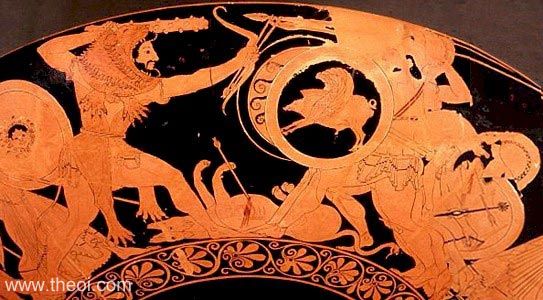
Pausanias, Description of Greece 1. 35. 7 - 8 (trans. Jones) (Greek travelogue C2nd
A.D.) :
"But what really caused me surprise is this. There is a small city of upper Lydia called ‘The Doors
of Temenos’. There a crest broke away in a storm, and there appeared bones the shape of which led one to
suppose that they were human, but from their size one would never have thought it. At once the story spread
among the multitude that it was the corpse of Geryon, the son of Khrysaor (Chrysaor), and that the seat also was
his. For there is a man's seat carved on a rocky spur of the mountain. And a torrent they called the river
Okeanos (Oceanus), and they said that men ploughing met with the horns of cattle, for the story is that Geryon
reared excellent cows.
And when I criticized the account and pointed out to them that Geryon is at Gadeira, where there is, not his
tomb, but a tree showing different shapes, the guides of the Lydians related the true story, that the corpse is
that of Hyllos (Hyllus), a son of Gaia (Gaea, Earth), from whom the river is named. They also said that Herakles
from his sojourning with Omphale called his son Hyllos after the river."
Pausanias, Description of Greece 3. 18. 13 :
"[Amongst the scenes depicted on the throne of Apollon at Amyklai (Amyclae) :] Herakles is driving off
Geryon's cows."
Pausanias, Description of Greece 4. 36. 3 :
"It seems the man of those days made it their business to amass wealth of this kind, herds of horses and
cattle, if it is the case that . . . Eurystheus, in view of the reputation of the Iberian cattle, ordered
Herakles to drive off the herd of Geryones. Eryx too, who was reigning in Sikelia (Sicily), plainly had so
violent a desire for the cattle from Erytheia that he wrestled with Herakles, staking his kingdom on the match
against these cattle."
Pausanias, Description of Greece 5. 10. 9 :
"[Amongst the images decorating the temple of Zeus at Olympia :] Above the doors of the temple is carved .
. . [Herakles' exploit] against Geryones at Erytheia."
Pausanias, Description of Greece 5. 19. 1 :
"[Amongst the scenes depicted on the chest of Kypselos (Cypselus) at Olympia :] The combat between
Herackles and Geryones, who is represented as three men joined to one another."
Pausanias, Description of Greece 10. 17. 5 :
"The tradition is that this [Nora] was the first city in the island [of Sardinia], and they say that Norax
[who founded it] was a son of Erytheia, the daughter of Geryones, with Hermes for a father."
Quintus Smyrnaeus, Fall of Troy 6. 249 ff (trans. Way) (Greek epic C4th A.D.)
:
"[Depicted on the shield of Herakles' grandson Eurypylos :] There lay the bulk of giant Geryon dead mid his
kine. His gory heads were cast in dust, dashed down by that resistless club. Before him slain lay that most
murderous hound Orthros (Orthrus), in furious might like Kerberos (Cerberus) his brother-hound: a herdman lay
thereby, Eurytion, all bedabbled with his blood."
Aelian, On Animals 12. 11 (trans. Scholfield) (Greek natural history C2nd A.D.)
:
"The Bulls of Khaonia (Chaonia) which, the inhabitants of Thesprotia and Epeiros (Epirus) call
‘fatted,’ trace their descent from the oxen of Geryones."
Philostratus, Life of Apollonius of Tyana 5. 4 - 5 (trans. Conybeare) (Greek
biography C1st to C2nd A.D.) :
"The city of Gadeira [in Iberia] is situated at the extreme end of Europe . . . They say that the latter
[Herakles of Thebes] penetrated as far as the neighbouring city of Erytheia, on which occasion he took captive
Geryon and his cows; and they say that in his devotion to wisdom he traversed the whole earth to its limits . .
. They say also that they saw trees here [at Gadeira] such as are not found elsewhere upon the earth; and that
these were called trees of Geryon. There were two of them, and they grew upon the mound raised over Geryon: they
were a cross between the pitch tree and the pine, and formed a third species; and blood dripped from their bark,
just as gold does from the Heliad poplar."
Ptolemy Hephaestion, New History Bk2 (trans. Pearse) (summary from Photius,
Myriobiblon 190) (Greek mythographer C1st to C2nd A.D.) :
"He [Hephaestion] recounts that Hera who fought on the side of Geryon was wounded on her right by
Herakles."
Oppian, Cynegetica 2. 100 ff (trans. Mair) (Greek poet C3rd A.D.) :
"These [the breed of bulls called Syrian] are they which report said Herakles, the mighty son of Zeus, when
fulfilling his labours, drove of old from Erytheia, what time he fought with Geryoneus beside Okeanos (Oceanus)
and slew him amid the crags; since he was doomed to fulfil yet another labour, not for Hera nor at the behest of
Eurystheus, but for his comrade Arkhippos (Archippus), lord of holy Pella."
Pseudo-Hyginus, Preface (trans. Grant) (Roman mythographer C2nd A.D.) :
"From Chrysaor and Callirhoe [was born] : three-formed Geryon."
Pseudo-Hyginus, Fabulae 30 :
"The triple-bodied Geryon, son of Chrysaor, he [Heracles] killed with a single weapon."
Ovid, Metamorphoses 9. 184 (trans. Melville) (Roman poet C1st B.C. to C1st A.D.)
:
"I [Heracles] faced unafraid . . . the triple heads of the herdsman of Hiberus [Geryon]."
Ovid, Heroides 9. 87 ff (trans. Showerman) (Roman poetry C1st B.C. to C1st A.D.)
:
"[Heracles] told of the deeds . . . The triple prodigy, Geryones, rich in Iberian cattle, who was one in
three."
Virgil, Aeneid 6. 289 (trans. Day-Lewis) (Roman epic C1st B.C.) :
"Many varieties of monsters can be found stabled here at the doors [of Hades] . . . the ghost of
three-bodied Geryon."
Pliny the Elder, Natural History 4. 120 (trans. Rackham) (Roman encyclopedia C1st
A.D.) :
"On the side facing Hispania [i.e. Spain] at a distance of about 100 yards is another island one mile long
and one mile broad, on which the town of Gadis was previously situated; Ephorus and Philistus call this island
Erythea . . . It was called Erythea, because the original ancestors of the Carthaginians, the Tyrians, were said
to have come from the Red Sea. This island is believed by some people to have been the home of the Geryones
whose cattle were carried off by Hercules; but others hold that that was another island, lying of Lusitania, and
that an island there was once called by the same name."
Seneca, Hercules Furens 231 ff (trans. Miller) (Roman tragedy C1st A.D.) :
"[The labours of Heracles :] Among his herds in the distant land of Hesperia [Spain] the three-shaped
shepherd [Geryon] of the Tartesian shore was killed and his cattle driven as spoil from the farthest west;
Cithaeron has fed the herd once to Oceanus known."
Seneca, Hercules Furens 480 :
"Threefold Geryon by one hand [Heracles'] overcome."
Suidas s.v. Boulei diamachesthai Geruoni tetraptiloi (trans. Suda On Line) (Byzantine
Greek Lexicon C10th A.D.) :
"Boulei diamachesthai Geruoni tetraptiloi--Do you want to do battle with a four-winged Geryon?:
That is, with a three-headed [one]. For he had three crests on his helmet and gave Herakles a hell of a
struggle."
Suidas s.v. Geryones :
"Geryones: A proper name. Aristophanes [writes] : ‘do you want to do battle with a four-winged
Geryones?’. Meaning four-headed . . . For Geryones, being three-headed, gave Herakles one hell of a
struggle."
Suidas s.v. Trikephalos :
"Trikephalos (three-headed) : For Geryones, being three-headed, gave Herakles a hell of a
struggle."
POETIC TITLES & EPITHETS
Greek Name
Γηρυονευς
Τετραπτιλον
Τρικεφαλος
Transliteration
Gêryoneus
Tetraptilon
Trikephalos
Latin Spelling
Geryon
Tetraptilon
Tricephalus
Translation
Singing? (gêryô)
Four-Winged (tetra-, ptilon)
Three-Headed (tri-, kephalê)
ANCIENT GREEK & ROMAN ART
SOURCES
GREEK
- Hesiod, Theogony - Greek Epic C8th - 7th B.C.
- Epic Cycle, Titanomachia Fragments - Greek Epic C8th B.C.
- Pindar, Odes - Greek Lyric C5th B.C.
- Pindar, Fragments - Greek Lyric C5th B.C.
- Greek Lyric III Stesichorus, Fragments - Greek Lyric C7th - 6th B.C.
- Greek Lyric III Ibycus, Fragments - Greek Lyric C6th B.C.
- Aeschylus, Agamemnon - Greek Tragedy C5th B.C.
- Aeschylus, Fragments - Greek Tragedy C5th B.C.
- Herodotus, Histories - Greek History C5th B.C.
- Plato, Gorgias - Greek Philosophy C4th B.C.
- Plato, Laws - Greek Philosophy C4th B.C.
- Apollodorus, The Library - Greek Mythography C2nd A.D.
- Parthenius, Love Romances - Greek Mythography C1st B.C.
- Diodorus Siculus, The Library of History - Greek History C1st B.C.
- Strabo, Geography - Greek Geography C1st B.C. - C1st A.D.
- Pausanias, Description of Greece - Greek Travelogue C2nd A.D.
- Aelian, On Animals - Greek Natural History C2nd - 3rd A.D.
- Philostratus, Life of Apollonius of Tyana - Greek Biography C2nd A.D.
- Ptolemy Hephaestion, New History - Greek Mythography C1st - 2nd A.D.
- Oppian, Cynegetica - Greek Poetry C3rd A.D.
- Quintus Smyrnaeus, Fall of Troy - Greek Epic C4th A.D.
ROMAN
- Hyginus, Fabulae - Latin Mythography C2nd A.D.
- Ovid, Metamorphoses - Latin Epic C1st B.C. - C1st A.D.
- Ovid, Heroides - Latin Poetry C1st B.C. - C1st A.D.
- Virgil, Aeneid - Latin Epic C1st B.C.
- Pliny the Elder, Natural History - Latin Encyclopedia C1st A.D.
- Seneca, Hercules Furens - Latin Tragedy C1st A.D.
BYZANTINE
- Suidas, The Suda - Byzantine Greek Lexicon C10th A.D.
BIBLIOGRAPHY
A complete bibliography of the translations quoted on this page.
